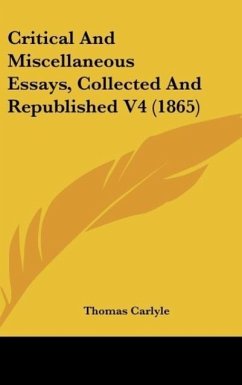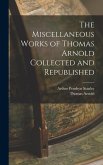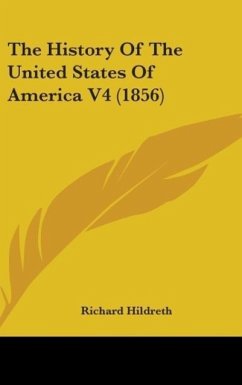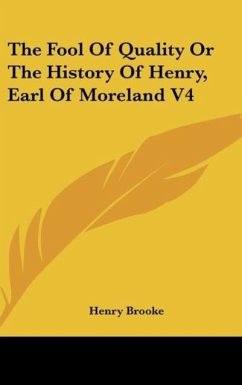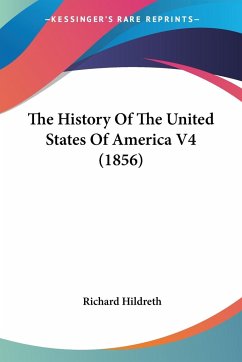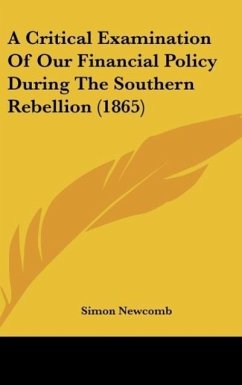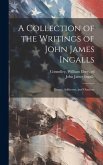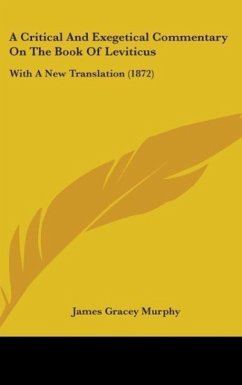Thomas Carlyle
Critical And Miscellaneous Essays, Collected And Republished V4 (1865)
Thomas Carlyle
Critical And Miscellaneous Essays, Collected And Republished V4 (1865)
- Gebundenes Buch
- Merkliste
- Auf die Merkliste
- Bewerten Bewerten
- Teilen
- Produkt teilen
- Produkterinnerung
- Produkterinnerung
In Four Volumes.
Andere Kunden interessierten sich auch für
![The Miscellaneous Works of Thomas Arnold Collected and Republished The Miscellaneous Works of Thomas Arnold Collected and Republished]() Arthur Penrhyn StanleyThe Miscellaneous Works of Thomas Arnold Collected and Republished37,99 €
Arthur Penrhyn StanleyThe Miscellaneous Works of Thomas Arnold Collected and Republished37,99 €![The History Of The United States Of America V4 (1856) The History Of The United States Of America V4 (1856)]() Richard HildrethThe History Of The United States Of America V4 (1856)51,99 €
Richard HildrethThe History Of The United States Of America V4 (1856)51,99 €![The Fool Of Quality Or The History Of Henry, Earl Of Moreland V4 The Fool Of Quality Or The History Of Henry, Earl Of Moreland V4]() Henry BrookeThe Fool Of Quality Or The History Of Henry, Earl Of Moreland V433,99 €
Henry BrookeThe Fool Of Quality Or The History Of Henry, Earl Of Moreland V433,99 €![The History Of The United States Of America V4 (1856) The History Of The United States Of America V4 (1856)]() Richard HildrethThe History Of The United States Of America V4 (1856)47,99 €
Richard HildrethThe History Of The United States Of America V4 (1856)47,99 €![A Critical Examination Of Our Financial Policy During The Southern Rebellion (1865) A Critical Examination Of Our Financial Policy During The Southern Rebellion (1865)]() Simon NewcombA Critical Examination Of Our Financial Policy During The Southern Rebellion (1865)31,99 €
Simon NewcombA Critical Examination Of Our Financial Policy During The Southern Rebellion (1865)31,99 €![A Collection of the Writings of John James Ingalls; Essays, Addresses, and Orations A Collection of the Writings of John James Ingalls; Essays, Addresses, and Orations]() John James IngallsA Collection of the Writings of John James Ingalls; Essays, Addresses, and Orations37,99 €
John James IngallsA Collection of the Writings of John James Ingalls; Essays, Addresses, and Orations37,99 €![A Critical And Exegetical Commentary On The Book Of Leviticus A Critical And Exegetical Commentary On The Book Of Leviticus]() James Gracey MurphyA Critical And Exegetical Commentary On The Book Of Leviticus36,99 €
James Gracey MurphyA Critical And Exegetical Commentary On The Book Of Leviticus36,99 €-
-
-
Produktdetails
- Produktdetails
- Verlag: Kessinger Publishing, LLC
- Seitenzahl: 404
- Erscheinungstermin: 2. Juni 2008
- Englisch
- Abmessung: 235mm x 157mm x 28mm
- Gewicht: 804g
- ISBN-13: 9781436537698
- ISBN-10: 143653769X
- Artikelnr.: 24601690
- Herstellerkennzeichnung
- Libri GmbH
- Europaallee 1
- 36244 Bad Hersfeld
- gpsr@libri.de
- Verlag: Kessinger Publishing, LLC
- Seitenzahl: 404
- Erscheinungstermin: 2. Juni 2008
- Englisch
- Abmessung: 235mm x 157mm x 28mm
- Gewicht: 804g
- ISBN-13: 9781436537698
- ISBN-10: 143653769X
- Artikelnr.: 24601690
- Herstellerkennzeichnung
- Libri GmbH
- Europaallee 1
- 36244 Bad Hersfeld
- gpsr@libri.de
Thomas Carlyle was a British writer, historian, and philosopher who was born on December 4, 1795, and died on February 5, 1881. He was from the Scottish Lowlands. He was one of the most important writers of the Victorian age and had a big impact on art, literature, and philosophy in the 1800s. Born in Ecclefechan, Dumfriesshire, Scotland, Carlyle went to the University of Edinburgh and invented the Carlyle circle while there. When the arts course was over, he worked as a schoolmaster and studied to become a minister in the Burgher Church. He gave up on these and other things before he decided to write for the Edinburgh Encyclopaedia and work as a translator. Early on, he was successful by introducing little-known German literature to English readers through translations, his 1825 book Life of Friedrich Schiller, and review essays he wrote for a number of magazines. Ralph Waldo Emerson was an American essayist, speaker, philosopher, abolitionist, and poet who lived from May 25, 1803 to April 27, 1882. He went by his middle name, Waldo. He led the transcendentalist movement in the middle of the 1800s. People looked up to him as a supporter of freedom and critical thinking, as well as a wise critic of how society and conformity can make people feel bad about themselves. He was called ""the most gifted of the Americans"" by Friedrich Nietzsche, and Walt Whitman called him his ""master."" Emerson slowly moved away from the religious and social beliefs of his time. In his 1836 essay ""Nature,"" he formulated and explained the theory of transcendentalism. After this, in 1837, he gave a speech called ""The American Scholar."" Oliver Wendell Holmes Sr. thought it was America's ""intellectual Declaration of Independence.""

